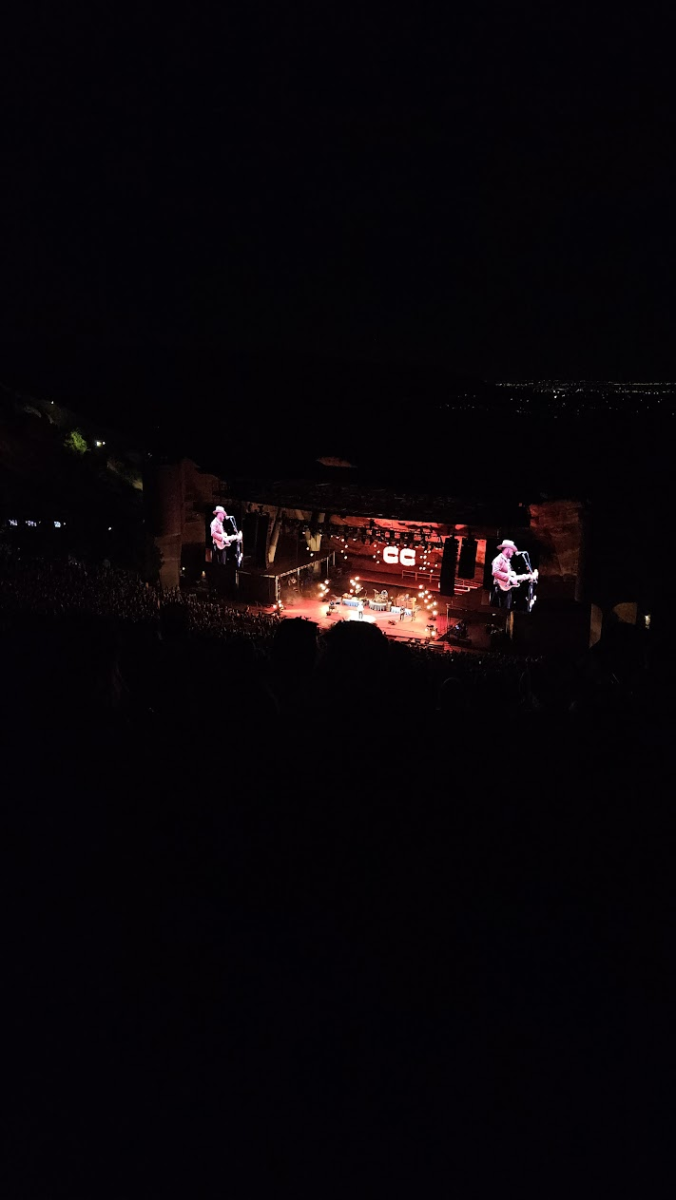Charley Crockett brought his unique brand to the Red Rocks Amphitheater on Thursday, September 12th. His first time headlining Red Rocks – he’s opened for Turnpike Troubadours and Orville Peck at the venue previously – the set was varied in song selections from his large discography and fast-paced throughout. The few brief pauses between songs often featured a single sentence of planned commentary which introduced the following tune. This sharply contrasted with the second opening act, Tanya Tucker, whose set featured long breaks for reminiscence, nostalgia, and plugs for liquor brands with which she is associated.
For the uninitiated, Crockett’s music defies simple categorization or siloing. His art lies somewhere in the confluence of country, folk, blues, and bluegrass. He acknowledges this fact, admitting that “they call me country” but he consistently defines himself as a folk singer. This self-characterization fits him within a genre that has undergone significant change in the 20th and 21st centuries and Crockett lays his sound somewhere between the lonesome sounds of the prairie and the funk grooves of the city. Some of his more famous tracks played at Red Rocks include: Music City, USA, Killers of the Flower Moon, Welcome to Hard Times, Man from Waco, Don’t Tell Me That, Trinity River, Silver Dagger, Jamestown Ferry, and, of course, the title track of his latest album, $10 Cowboy.
Common to these genres, his music makes frequent mention of place names which allude to a lifetime of travel. While today Crockett travels with a series of busses (and even a branded 18-wheeler), his earlier years featured roaming the United States by rail and hitchhike, adding authenticity to his music’s geographic variety. Many of his songs feature references to Texas, Dallas and Austin in particular, yet a broader emphasis is placed on the Sunbelt and Midwest. His set at Red Rocks favorably mentioned locales as near as Denver and as far as St. Paul. Although Crockett makes mention primarily of locations he’s visited for the purpose of communicating his travels, to the large audience at Red Rocks made up of many transplants and recent arrivals to Colorado, his mentions of cities around the country led to cheers from individuals throughout the set.
Closely related to the places he sings of fondly, there are locations which he disparages. This leads to a significant feature of Crockett’s music, populism. Folk music and, to a far greater extent, country music is often home to many populist sentiments – the veneration of “the people” and ridicule or detestation of “the elites.” Crockett’s mixed life experience and hard journey traveling lends itself to populist resentment and many of his lyrics showcase this. Cities like New York, Los Angeles, San Francisco, and even Nashville are lamented as unkind and nearly foreign to the working-class artist and his music.
Although populism can be dangerous in politics, Crockett’s presentation largely serves to connect an audience that is as diverse as his various adventures. The family on my left had driven from Wyoming for the show and hollered at the pedal guitar solos while the man on my right, an urbanite from down the road, cheered at the lyrical mention of Denver. Throughout the audience, cowboy hats and spurs mixed with flat-brimmed hats and trendy overalls. This unique mix of individuals speaks broadly to the value of Crockett as an artist, namely to his authenticity. Unlike some artists in the genres that influence Crockett, there is no bar/club with his name on Broadway Street in Nashville, he doesn’t own thousands of acres, and most significantly, is based in authenticity.
Opinion: Charley Crockett and the populism of country
September 15, 2024

